A client who shifted his behaviour, attitudes and practices remarkably, shared with me that our coaching partnership opened up his world in unexpected ways. He became much more observant of what was going on around him. He noticed things that he had previously not seen or paid attention to on his way to and from his home to his office. This had beneficial impacts on how he related to his colleagues and family.
This inspired me to take up a 30 Day Challenge to heighten my ability to observe everyday things around me, to reflect on what messages and interpretations they evoke and how I can improve my self-awareness and engagement with others.
In particular, I am curious to:
* notice what I notice
* explore what I can learn from these observations
* adapt these everyday lessons to my work and life more broadly.
I’ve selected a period of 30 days, sometimes thought to be the length of time it takes to form a habit. It will require commitment and discipline. I want to “walk my talk”.
I also want to experiment with practices that can be adopted daily and that are not onerous. Many of my clients are overwhelmed and doing extra work is daunting. So I want to play with simple and effective ways to improve self-awareness that my clients can embrace.
#30DayChallenge #SelfAwareness #Leadership #EverydayQuestions #EverydayLessons #Noticing #ExecutiveCoaching #Experimenting #Discovery #Exploration #Reflection


Notice what I notice, an interesting exercise. When we notice something it is always meaningful for us in some way, because it is what is on our mind these days or it is a preoccupation of our unconscious. Particularly to increase our self-awareness the latter seems interesting to explore because it draws our attention to our unaware values, cares, desires and also fears.
As it is all about self-awareness, learning to observe our emotional and body reaction when something catches our attention positively or negatively is powerful learning because it are these emotions which ultimately shape our thoughts and actions. Without the capability of observing our emotions and feel our bodily reactions/contractions we can think and behave quite un-appropriately.
When I say notice or observe, I truly mean notice and observe NOT analysing, nor judging, nor criticsing, just notice, your anger, fear, joy. I quite like the word witnessing as there is a certain generosity and compassion in it. We learn to witness our thoughts and feelings, not to change them, but to get to now ourselves, our courage, our joy and our fears, all of these feelings are parts of who we are, and it is our life task to learn to own them. -Noticing them is the beginning!
You make some very useful points Regula. As you say, as part of learning to notice and observe it is important to witness without judgement. If we judge or condemn what we are noticing it can prevent us from learning about ourselves since our focus is on the thing we are judging/condemning.
Also becoming familiar with the emotions we feel and our bodily reactions (e.g. contractions in our muscles or breathing) gives us greater clues about ourselves. With these greater clues we have the beginnings of choice; to move from an unconscious reaction to a more conscious response.